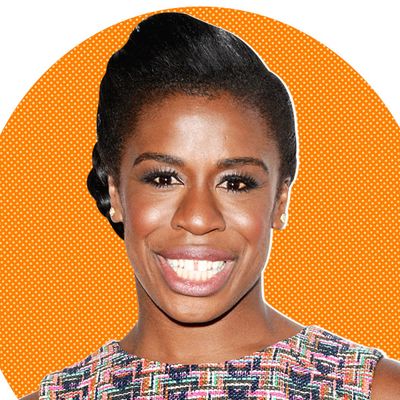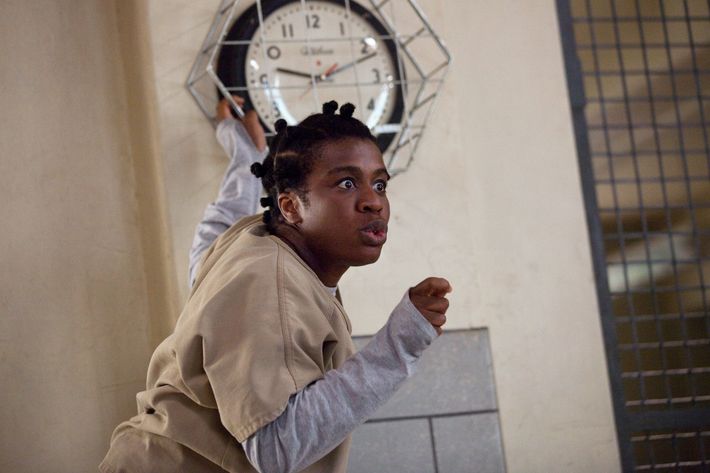
“I’ll be on the train and it’s like people expect me to come in with Bantu knots and a jumpsuit, or just start striking conversations up with them while stroking their leg,” Uzo Aduba said to me recently. We were sitting in the library room of New York’s NoMad Hotel, a surrounding too posh for this Vulture reporter, but one in which Aduba, wearing a sailor-striped tee with aviator sunglasses perched on her head, looked perfectly at ease. Of all the transformations made by Orange Is the New Black actresses to inhabit their roles, Aduba’s might be the most dramatic. Poised, thoughtful, and possessing a warm gaze, the 33-year-old actress didn’t appear to be anything like Suzanne Warren, a.k.a. Crazy Eyes, the wild, boundless Litchfield resident who intimidates her fellow prisoners with her bug-eyed stares and explosive, unpredictable energy. “I can watch people and they’re like, ‘You look so different in real life,’” said Aduba. “They’re almost [thinking], She’s in a dress … but is she still crazy?”
I had first met Aduba back in May after she’d thrown down with three of her castmates in a trivia event at the Vulture festival. She’d come out onto the stage looking impossibly stylish in a black drop-crotch jumpsuit and sapphire heels, and the crowd had reacted with wild applause. A breakout star on a show coming off its breakout season, Aduba had already earned adoration across the internet (“I threw my pie for you.”) and would soon land an Emmy nomination in the Outstanding Guest Actress category (she was bumped up to season regular for season two), but seemed genuinely surprised about the outpouring of fan love at the event. Until the show, she had worked in the relative anonymity of theater, with her biggest role being a supporting role in 2011’s revival of Godspell on Broadway; she told me that she was just about to move on from acting when she got the call from her agent and manager informing her that she had gotten a part on Orange. It didn’t even faze her that she hadn’t won the role she’d auditioned for — Janae, the track star — but that the show was offering her the part of Crazy Eyes instead.

If Crazy Eyes was a comic figure in the first season, she is tinged with tragedy in the second. The evolution is due in large part to Aduba’s love for the character and her refusal to think of Suzanne as being a joke. (Throughout our conversation, she never referred to her character as “Crazy Eyes,” but always as Suzanne.) “I see that part of her in me, when I see that little girl,” said Aduba, referring to the second-season episode that gives her backstory, where another actress plays a younger Suzanne, adopted by a white family, who is all energy and pink butterfly wings. “That’s why I’m so protective of her, because I can see what it looks like to not get that support. I could be Suzanne. That story.”
Aduba grew up in Medfield, Massachussetts, a town of just 12,000 people, where she and her four siblings (she’s No. 3) were the only Nigerian family around. “It’s not something impressed on you or said to you, but there’s a feeling like one of these things is not like the other — feeling a step outside the center,” she said, drinking jasmine green tea. “At least I had my family to negotiate these waters with together.” She might have felt outside of things, but her parents wanted her to experience everything. She went to church every Sunday, waking up extra early to go to choir practice beforehand. She did ice-skating, track, drama club, you name it. “My parents wanted us to be well-rounded individuals and really have the American experiences as richly as one can,” she said. This is where the two stories — Suzanne and Uzo — diverge, where Uzo could never have become Suzanne.
For instance, the final scene flashing back to Suzanne’s past is an inverse of a real-life one that Aduba described to me. On the show, Suzanne is supposed to sing at her high-school graduation, but, stymied by her self-flagellation, stands at the podium saying, “I can’t” and hitting herself in the head. “That challenge of not being accepted — just as you are, just as I am — is enough,” Aduba said. “I think those scars are ones that don’t ever really heal.” In her own life, Aduba was in sixth grade when her choir teacher Mr. Hersee asked if she had given any thought to performing in the talent show. Nope. He asked her if she knew any songs. She shook her head. Well, what about ones on the radio? She knew Whitney Houston’s rendition of “I Will Always Love You.” So Mr. Hersee got on the piano and started to play the song. As Aduba told me the story, she softly sang the iconic line — “And IIIIII …” — and her voice cut through clear and bright. She closed the talent show with that performance and got a standing ovation. “It wasn’t until that moment that I was like, I think I can sing,” she said.
Mr. Hersee is just one of the many teachers that Aduba spoke fondly about. (“I’m a teacher lover,” she admitted.) She said that she still talks to her second-grade teacher, “Miss Featherman,” who recognized her precocity. In high school, Sarah Mehlies, the director of the drama club, pushed her to study voice in college. There was a class with Tara Rubin. And then there is her mother, a strong, proud Nigerian woman who came to life when Aduba imitated her voice. She once asked her mom if she could start going by Zoe. “She stopped and she looked at me and she was like, ‘Why?’” said Aduba. “She didn’t play around, my mom, not at all. I was like, ‘Nobody can say Uzoamaka.’ And she said, ‘If they can learn to say Tchaikovsky and Michelangelo and Dostoevsky, then they can learn to say Uzoamaka.’ And she went right back to cooking.” Aduba snapped her finger. “And I was like, ‘What’s a Dostoevsky?’”
Aduba said that when she announced that she wanted to go to art school, her parents told her that they didn’t think the arts should be more than a hobby. “I went home and I asked my parents three times [over] three days,” she recalled. They wanted her to do something in the professional sphere. But then, on the third day, her mom relented. “She was in the kitchen again — she was probably always, cooking for five kids — and she said, ‘Okay.’ And they’ve been the support that I don’t think I could have even dreamed of. It makes me want to get choked up right now.” Her eyes get glassy. “It is beyond beyond support.”
It was this kind of affirmation that her character Suzanne was so desperately searching for and found in some form with Vee, the villainess of season two. Vee gave young, black women like Suzanne and Taystee what they felt they never had: acceptance, a place in the world, a mother. Vee was the first person to address her as Suzanne and actually mean it. She told her to hold her head up high, that she was a garden rose. And for Suzanne, who had been starved for so long, she just devoured it. “She was just intoxicated by her,” Aduba said of her character. “And this is somebody who looks like me and wants to be around me and who wants to invest in me. Who sees me … I could feel that bell in the writing: Wait a second. You see me?”
After she received an invitation to attend the White House Correspondents’ Dinner in May, Aduba told her mother about it while the two, along with Aduba’s sister Chi-Chi, were driving home to Massachusetts. “She was silent; she [just] looked at me,” recalled Aduba, and then, when she wondered aloud whether her mother knew what the dinner was, her reply was [adopting her mother’s voice], “Of course. The one that’s on CSPAN.” Aduba switched back to her own voice. “[She meant], ‘Of course. I’m not a fool, kid. I have two masters. Get out of here.’ I just remember looking at her and seeing her in the backseat. In her eyes and in her face, she was just really quiet. And I could just see her taking it in. Her head shaking like this.” She shook her head slowly, like trying she was trying to remember a fuzzy memory. “She looked back at me and said, ‘Uzo. Well done.’ She doesn’t say it twice. I’ll never forget that. I felt so proud.”

